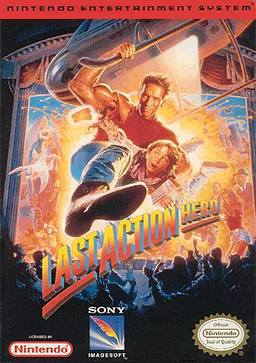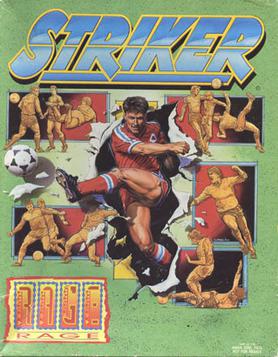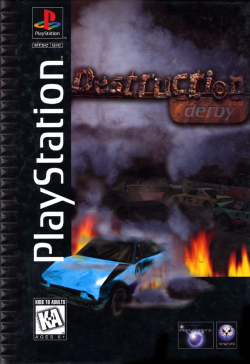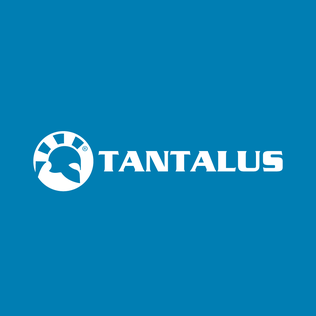
The Sega Saturn is a home video game console developed by Sega and released on November 22, 1994, in Japan, May 11, 1995, in North America, and July 8, 1995, in Europe. Part of the fifth generation of video game consoles, it is the successor to the successful Genesis. The Saturn has a dual-CPU architecture and eight processors. Its games are in CD-ROM format, including several ports of arcade games and original games.

Discworld II: Missing Presumed...!? is a 1996 point-and-click adventure game based on Terry Pratchett's series of fantasy novels set on the mythical Discworld, and sequel to the 1995 video game of the same name. The story sees players assume the role of Rincewind the "wizzard" as he becomes burdened with the task of finding Death and coercing him out of an impromptu retirement and back into his regular duties. The game's plot borrows from a number of Discworld books, including key elements from Reaper Man and Moving Pictures.

Discworld is a point-and-click adventure game developed by Teeny Weeny Games and Perfect 10 Productions and published by Psygnosis. It is based on Terry Pratchett's novels of the same name. Players assume the role of Rincewind the "wizzard", voiced by Eric Idle, as he becomes involved in exploring the Discworld for the means to prevent a dragon terrorising the city of Ankh-Morpork. The game's story borrows elements from several Discworld novels, with its central plot loosely based on the events in Guards! Guards!

Discworld Noir is a 1999 adventure game developed by Perfect Entertainment and published by GT Interactive. The game is set in Terry Pratchett's satirical Discworld universe, and follows its first and only private investigator as he is given a case leading him into the deadly and occult underbelly of the Discworld's largest city.
Rage Games was a British video game developer. Formed in Liverpool in 1992, its video games were marked by an emphasis on graphical effects with arcade gameplay.

Primal Rage is a fighting game developed and released by Atari Games to arcades in 1994. The game takes place on a post-apocalyptic version of Earth called "Urth". Players control one of seven large beasts that battle each other to determine the planet's fate. Matches feature many of the conventions of fighting games from the era, including special moves and gory finishing maneuvers. Ports were released for home consoles and personal computers. Efforts to perfectly emulate the arcade original have been unsuccessful due to the use of an unusual copy protection method. Toys, comics, a novel and other merchandise tie-ins were produced. More than 1.5 million copies of the game were sold.

Last Action Hero is a series of action video games based on the 1993 film of the same name. Versions were released for the NES, Super NES, Sega Genesis, Game Boy, Game Gear, and MS-DOS. Versions were also planned for the Sega CD and Master System, but ultimately were not released.

Wipeout 2097 is a racing video game developed and published by Psygnosis. It is the second installment released in the Wipeout series and the direct sequel of the original game released the previous year. It was originally released in 1996 for the PlayStation, and in 1997 for Microsoft Windows and the Sega Saturn. It was later ported by Digital Images to the Amiga in 1999 and by Coderus to Mac OS in 2002.

Striker is a soccer video game series first released by Rage Software in 1992.

Ultimate Soccer is a 1993 soccer video game by Rage Software released for the Mega Drive/Genesis, Master System and Game Gear by request of Sega which even allowed their mascot, Sonic, to be featured in the game menus. While similar in name, it has no relations with the Ultimate Soccer Manager series, but was followed by Striker still for the Mega Drive/Genesis, Striker '96, released for MS-DOS, Sega Saturn, and PlayStation, and Striker Pro 2000, released for PlayStation and the Dreamcast. While never published to the Super Nintendo Entertainment System, Rage developed other games for the Nintendo console, including Elite Soccer, Manchester United Championship Soccer and World Soccer 94 – Road to Glory.
Appaloosa Interactive was a corporation, founded in 1982 in Hungary, that produced video games, computer programs and television commercials during the 1980s and 1990s.

Destruction Derby is a vehicular combat racing video game developed by Reflections Interactive and published by Psygnosis. Based on the sport of demolition derby, the game tasks the player with racing and destroying cars to score points. The developers implemented simulated physics to make the results of collisions easier to predict, and they kept the game's tracks small to increase the number of wrecks. Versions of Destruction Derby were released for MS-DOS, PlayStation and Sega Saturn. Critics found Destruction Derby enjoyable and they praised its graphics and car damage system, but the Sega Saturn releases received mixed reviews. The game started the Destruction Derby franchise, beginning with its 1996 sequel, Destruction Derby 2.

Predator 2 is a 1992 second video game adaptation of the film of the same title, developed by Teeny Weeny Games and Krisalis Software and published by Acclaim Entertainment. It was released for the Sega Genesis, Game Gear, and Master System.

Williams Arcade's Greatest Hits is a video game anthology for the Super Nintendo Entertainment System, PlayStation, Sega Genesis, Saturn, Game.com, Dreamcast, MS-DOS, and Microsoft Windows. The IBM PC compatible and game.com versions are titled Williams Arcade Classics, while the Saturn version was titled Midway Presents Arcade's Greatest Hits. The 2000 release Midway's Greatest Arcade Hits Vol. 1 contains much of the same content.

Tantalus Media is an Australian video game developer based in Melbourne. It was founded in 1994 by programmers Andrew Bailey and Trevor Nuridin. Since its inception, Tantalus has developed almost 100 games and has won multiple game awards. In March 2021, Keywords Studios acquired 85% of Tantalus Media for US$46.8 million.

FIFA Soccer 96 is a football simulation video game developed by Extended Play Productions and released by Electronic Arts in 1995. It was released for the Mega Drive/Genesis, Sega Saturn, Sega 32X, Game Gear, PlayStation, Super Nintendo Entertainment System, and MS-DOS compatible operating systems.

Sega Corporation is a Japanese multinational video game and entertainment company headquartered in Shinagawa, Tokyo. Its international branches, Sega of America and Sega Europe, are headquartered in Irvine, California, and London. Its division for the development of both arcade games and home video games, Sega Games, has existed in its current state since 2020; from 2015 to that point, the two had made up separate entities known as Sega Games and Sega Interactive Co., Ltd. Sega is a subsidiary of Sega Sammy Holdings. From 1983 until 2001, Sega had also developed video game consoles.














